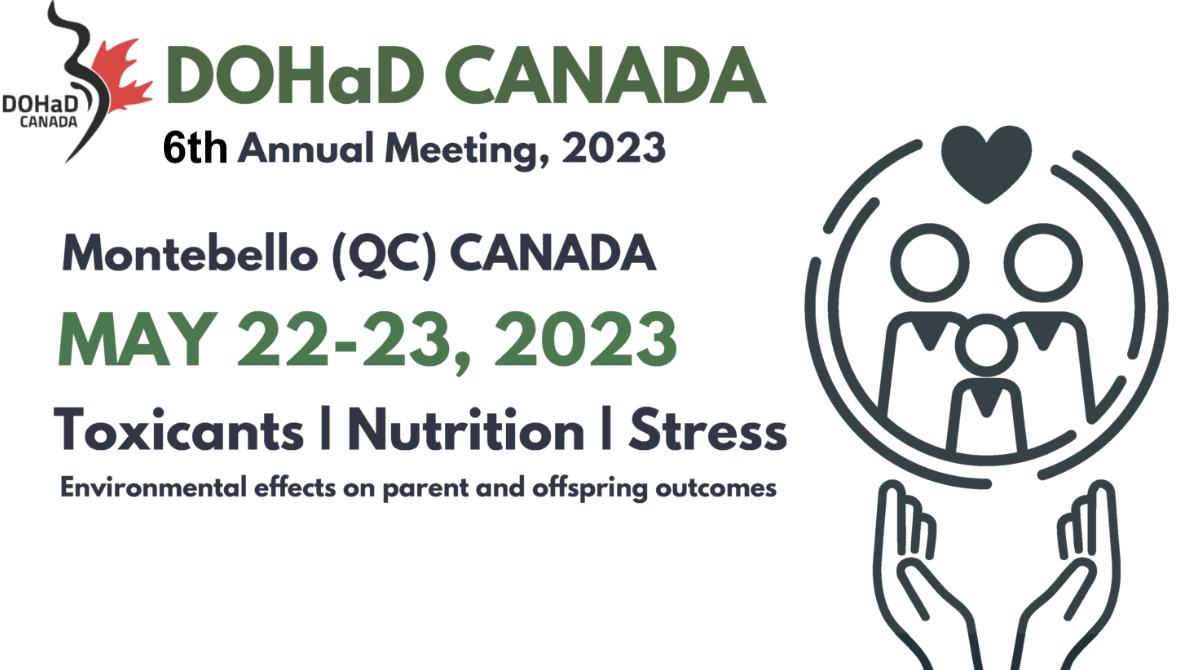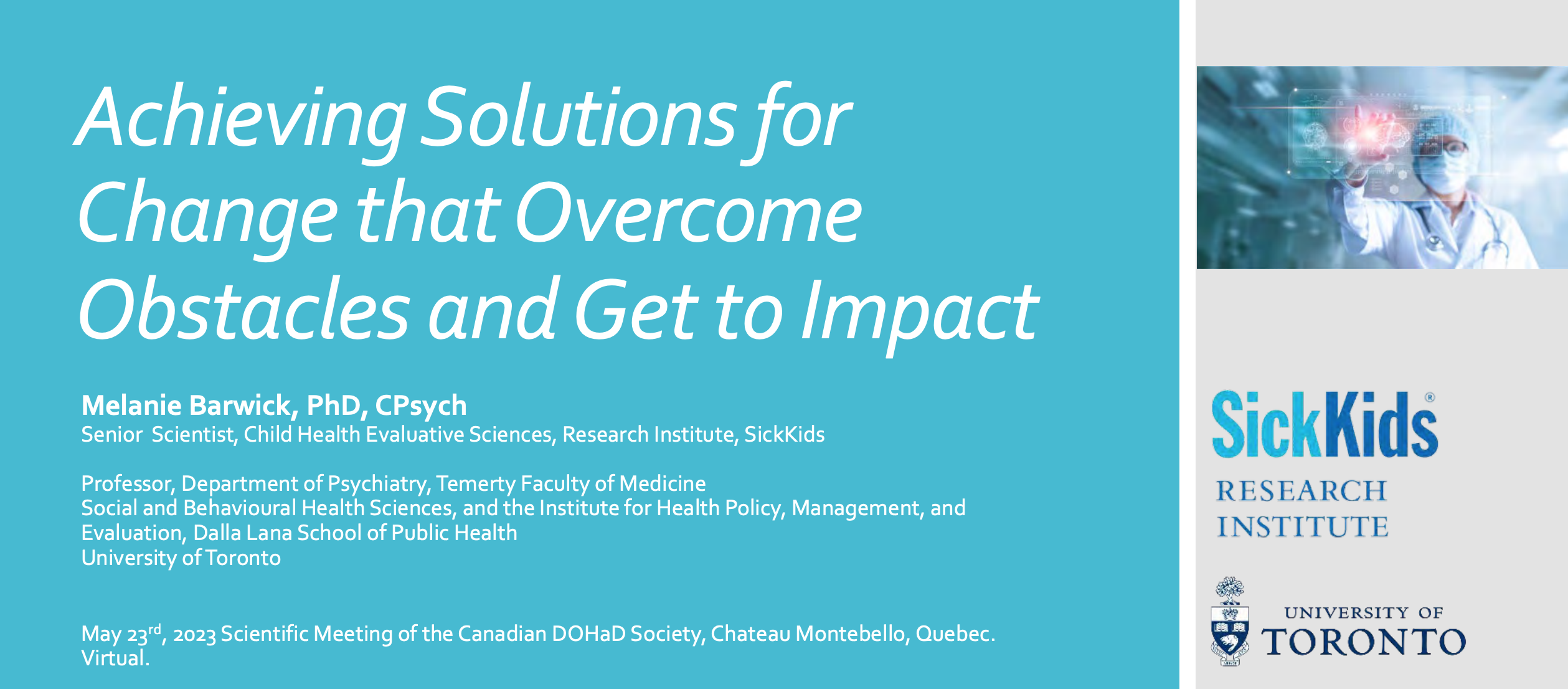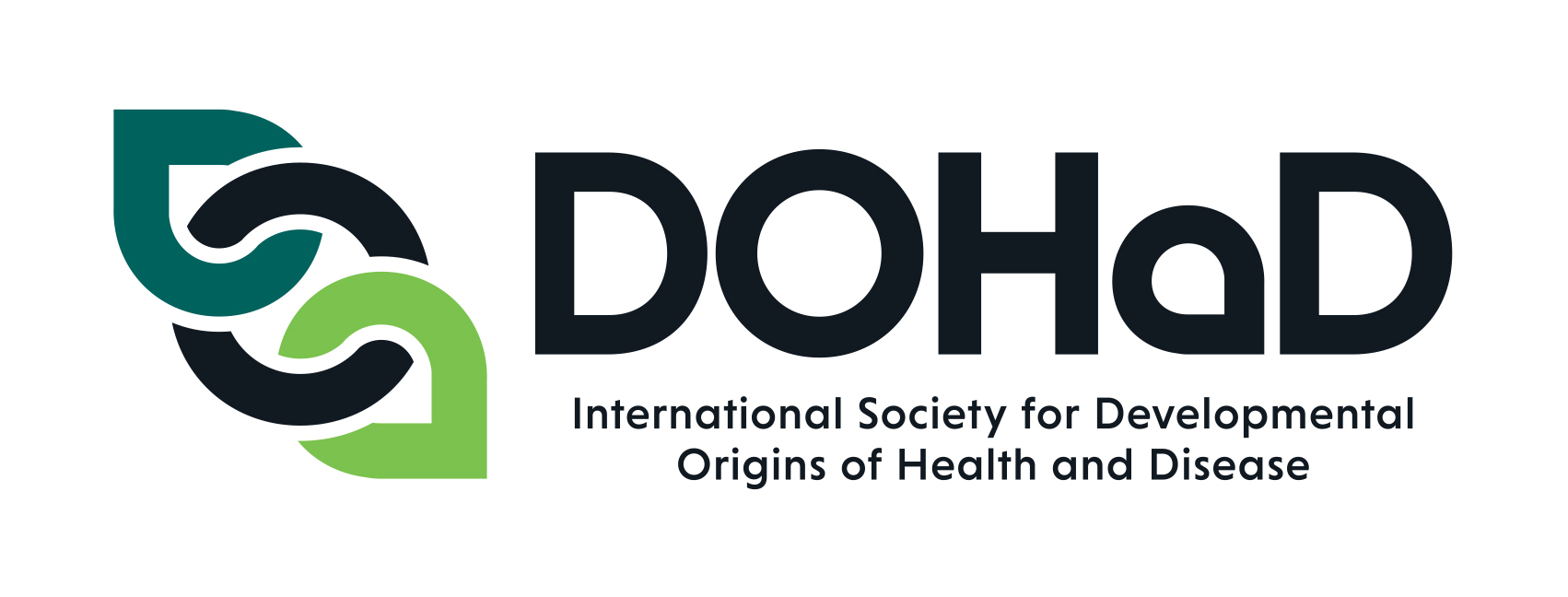2023 Scientific Meeting of the Canadian DOHaD Society
May 22-23, 2023
Fairmont Le Château in Montebello, QC
Monday May 22 Event Room 17:00 - 19:30 Registration Canada Room Foyer 19:30 DOHaD Dinner Canada Room Tuesday May 23 Event Room 7:15 - 8:15 Buffet Breakfast Aux Chantignoles 8:15 - 8:40 Welcome Address Dr. Tara Perrot, Conference Co-Chair Canada Room 8:40 - 9:25 Keynote Address Canada Room 9:25 - 10:45 DOHaD Advocacy / Dissemination in Canada Discussion / Break-Out Tables Canada Room 10:45 - 11:00 Coffee / Tea Canada Room 11:00 - 12:30 Talk Session – Enironmental Toxicants Speaker: Ms. Battsetseg Ulziikhuu Canada Room 12:30 - 13:30 Lunch & DOHaD Canada Council Meeting Canada Room 13:30 - 14:45 Talk Session – Diet / Nutrition Invited Speaker: Kozeta Miliku Canada Room 14:45 - 15:15 Coffee / Tea Canada Room 15:15 - 16:30 Talk Session – Early Life Environment Speaker: Dr. Robert Levitan Canada Room 16:30 - 17:00 Wrap-Up Discussion Session Canada Room 17:00 - 19:00 Poster Session Canada Room
Dr. Stephen Matthews, DOHaD Canada President
Dr. Amanda Kentner, Massachusetts College of Phamacy and Health Sciences
A Trifecta of Influence: the developmental effects of environmental complexity on body, brain, and behaviour
(*See her bio section in the Keynote Speaker for the abstract)
Invited Speakers: Dr. Melanie Barwick, Dr. Deborah Da Costa
Trainee Flash Talks: Ysmaris Cariaco, Camille Girard-Bock, Elizabeth O'Leary, Sawayra Owais, Battsetseg Ulziikhuu
Moderator: Tara Perrot, PhD
Invited Speaker: Dr. Anne Konkle
Examining the Impact of Canadian Arctic Contaminants on Perinatal Maternal Brain Plasticity and Behaviou
(*See her bio section in the Speakers – PI tab for the abstract)
Invited Speaker: Dr. Christine Till
The Neurotoxicity of Fluoride: A Wake-up Call
(*See her bio section in the Speakers – PI tab for the abstract)
Speaker: Ms. Yourdasmine Ali Daoud
Development of a pregnancy physiologically based pharmacokinetic (p-PBPK) model for lead: estimation of the prenatal internal exposure of a French cohort
Speaker: Ms. Elisa Thépaut
Fetal exposure to pyrethroids using p-PBPK modeling toxicokinetics based on the physiology of pregnant women
Who benefits most from a prenatal HEPA filter air cleaner intervention on childhood cognitive development? The UGAAR randomized controlled trial
Moderator: Libby Myles, MSc
Preschool dietary patterns in Canadian Children and their role in cardiometabolic disease development
(*See her bio section in the Speakers – PI tab for the abstract)
Speaker: Dr. Thoko Hanjahanja-Phiri
Primiparity and Prenatal Supplementation in Drought and Non-Drought Settings – A natural experiment in Malawi
Speaker: Ms. Amélie Taschereau
Maternal glycemia in pregnancy is associated with longitudinal variations in blood DNAm at FSD1L gene longitudinally from birth to 5 years of age
Speaker: Ms. Elizabeth O’Leary
Maternal Diet and Probiotic Treatment Affects Both Dam and Offspring Leptin Outcomes in Long-Evans Rats
Moderator: Kiera O'Neil, PhD
A Novel Approach to Study Season of Conception and Neurodevelopmental Risk based on Maternal History of Seasonal Affective Disorder: Preliminary Findings for Executive Functioning in Pre-Schoolers
Speaker: Ms. Camille Girard-Bock
Beneficial effects of 14-week physical activity intervention in a subgroup of young adults born very preterm with high blood pressure
Speaker: Dr. Shiliang Liu
Association of maternal depression and hypothyroidism with infant gastroschisis: A population-based cohort study in Canada
Speaker: Ms. Sawayra Owais
Prevalence and Determinants of Depression and Anxiety During Pregnancy Among the Métis in Alberta, Canada
Speaker: Ms. Nicola Schatz
Generational Epigenetic Programming by Stress May Promote the Risk of Neurodegenerative Diseases: Evidence from a Rat Model
Trainee Flash Talks: Savana Biondic, Cyntia Duval, Bona Kim, Jenna Richardson
Wrap-Up Comments and Discussion (Tara Perrot)
Select posters will be presented in person in 3MT format
Discussion with poster presenters
Talk Title: A Trifecta of Influence: the developmental effects of environmental complexity on body, brain, and behaviour
Dr. Amanda (Mandy) Kentner earned her PhD in Experimental Psychology at the University of Ottawa, Canada, focusing on sex differences in depression. Currently, Dr. Kentner is a Full Professor at the Massachusetts College of Pharmacy and Health Sciences (MCPHS), located in the Longwood Medical and Academic Area of Boston, Massachusetts. In this role, she directs a behavioral neuroscience focused laboratory examining how exposure to infection during early development imparts long-term disruptions in social and cognitive functioning. Her laboratory is also interested in factors that offer protective or rehabilitative potential, for example environmental enrichment, maternal care, and pharmacological agents.
Dr. Kentner has received multiple MCPHS Excellence in Research Mentorship awards and was honored with the inaugural MCPHS Gail P. and Edward A. Bucher Trustees’ Award for Excellence in Student-Faculty Research Collaboration in 2018. Her laboratory is supported by an R15 AREA grant from the National Institute of Mental Health.
Abstract: Perinatal infections are associated with social, cognitive, and sensory impairments in offspring. These impairments tend to occur in later life and in a sex-dependent manner, whereby males are reportedly more vulnerable than females. Using rodent models of maternal immune activation, we show developmental programming by a reduction of the placental enzyme 11β-Hydroxysteroid dehydrogenase (11β-HSD2), suggesting disturbances in glucocorticoid metabolism following inflammatory stressors. These placental effects correlated with sustained and sex-specific changes in a constellation of stress (e.g., Nr3c1, Crhr1) and epigenetic (e.g., Ogt, Dnmt1, Mcep2) writers in placenta and fetal/adolescent brain. Impairments in offspring social behaviors were also present following maternal immune activation. While males tended to both initiate and receive less contact from their conspecifics, the apparent resiliency of females was tied to the particular social test and immunogen employed. Importantly, life-long exposure to environmental enrichment promoted resiliency against the social, and many of the physiological, impacts of maternal immune activation in both male and female offspring. We propose that this resiliency is mediated by changes in maternal care, lactation quality, and by an attenuation of disruptions directed towards the dynamics of glucocorticoid metabolism. Given that enrichment has demonstrated clinical relevancy in human rehabilitation settings, applying some of the elements of these clinical protocols (e.g., enhanced social, physical, cognitive stimulation) to animal models of health and disease allows for the exploration of the mechanisms that underlie their success. This work was funded by NIMH under award number R15MH114035.
Dr. Anne TM Konkle is an Assistant Professor in the Interdisciplinary School of Health Sciences at the University of Ottawa since 2009. Her research focus is on better understanding the mother/infant dyad. Her work serves to characterize the impact of in utero/pregnancy and neonatal/ postpartum exposure to environmental perturbations (including stress, maternal infection, toxicants, noise, etc) on development of the brain in the offspring but also on plasticity of the maternal brain and related maternal behaviours. Given that offspring brain development and behaviour are uniquely tied in with maternal care – better understanding the plasticity of the maternal brain and how environmental factors may affect this plasticity is key to understanding interactions between direct and indirect environmental effects on offspring brain development. A multidisciplinary approach finds her investigating the social media representation of peripartum mental health in order to better understand the information typically available to the lay person and how this might impact their perceptions and behaviours; her ultimate goal being awareness and advocacy for mental health, toward a de-stigmatization of mental health, and providing better social support to individuals with peripartum mental health issues.
Talk Title: Examining the Impact of Canadian Arctic Contaminants on Perinatal Maternal Brain Plasticity and Behaviour
Abstract: The developing nervous system is particularly vulnerable to the effects of environmental perturbations. These can disturb different developmental processes that can have long lasting effects. A variety of signals in the in utero and neonate’s environment may affect brain development and behaviour. An important consideration is the environment provided by the mother. She nourishes and cleanses, and offers warmth, sensory stimulation and protection to her offspring. However, little is known about the consequences on the mother of perturbations to the mother’s own environment during pregnancy and post partum. Effects on plasticity of her brain and consequently maternal behaviour could disrupt the environment she provides for her offspring. Given that offspring brain development and behaviour are uniquely tied in with maternal care, better understanding the plasticity of the maternal brain and how environmental factors may affect it is key to understanding interactions between direct and indirect environmental effects on offspring brain development and behaviour. High levels of environmental toxicants are present in the blood of populations living in the Canadian Arctic; among others, these include methylmercury, polychlorinated biphenyls and organochlorine pesticides. The effects of complex combinations of these toxicants are rarely studied, even though individuals are typically exposed to multiple pollutants over time. Research findings suggest neurochemical changes in rodent models related to exposure to these environmental toxicants. While we have studied their effects from in utero or early life exposure on offspring neurodevelopment, singularly and in combination, very little work has focused on the impact they may have on perinatal maternal brain and behaviour. Our work tries to better understand the effects of this ecologically relevant toxicant mixture on the perinatal maternal brain.
Dr. Kozeta Miliku completed her Medical Doctorate at the Medical University of Tirana, Albania. Following her medical degree, she received a doctoral degree in Clinical Epidemiology, in the Generation R study, at the Erasmus University Medical Centre in the Netherlands. Dr. Miliku’s postdoctoral research at the University of Manitoba and McMaster University focused on understanding the role of early life nutrition and genetics in the developmental origins of chronic disease, including cardiometabolic health and asthma.
Currently, she is an Assistant Professor at the University of Toronto in the Department of Nutritional Science, an Adjunct Assistant Professor at McMaster University in the Department of Medicine and Chief Clinical Science Officer at the CHILD Cohort Study. Her research interest focuses on the field of developmental origins of health and disease, with a specific focus on cardiometabolic health. With dual expertise in medicine and epidemiology, Dr. Miliku uses a trans-disciplinary approach to bridge the traditional pillars of research. Her current projects are incorporated in birth cohorts and focus on the role of preconception nutrition. The ultimate goal is to prevent chronic disease through evidence-informed interventions during critical periods of development.
Talk Title: Preschool dietary patterns in Canadian Children and their role in cardiometabolic disease development
Abstract: Background: Cardiometabolic disease (CMD) is the leading cause of morbidity and mortality worldwide. According to the World Health Organisation report in 2014, 80% of premature death from CMD could be prevented by a healthy lifestyle, where diet is a crucial component. CMD risk factors can be traced back to nutrition during early life. Early childhood is a critical period of development in which resilience is developed, and important aspects for future health are established, including dietary patterns. Previous literature suggests that early childhood dietary patterns can track throughout life. Therefore, we aimed to determine dietary patterns in Canadian preschoolers and identify their role in CMD risk factors development.
Methods: We leveraged data from a subset (n=2400 participants) of one of the largest population-based prospective Canadian pregnancy cohorts, the CHILD Cohort Study. We used a 112-item Food Frequency Questionnaire to collect information on child diet intake at three years of age. At age five, child weight, height, waist and hip circumference, and systolic and diastolic blood pressure were measured using standardized protocols. We employed data-driven approaches to derive dietary patterns and regression analyses to determine the associations of dietary patterns with health outcomes. The analyses were adjusted for potential parental, birth, and childhood factors. Child sex was considered a potential effect modifier.
Results and Conclusions: Among Canadian preschool children, we identified three dietary patterns: “Prudent” (characterized by a high intake of veggies, fruits, legumes, fish, and eggs); “Western-like” (characterized by a high intake of fast foods, red and processed meats, sweets, carbonated drinks); and “Snack” (characterized by a high intake of refined grains, cookies, cheese, and nuts). Preliminary analyses indicate sex-specific associations between dietary patterns and child CMD risk factors. Ultimately, this research will help inform dietary recommendations in preschool children to prevent the development of CMD risk factors.
Dr. Christine Till is a Professor in Clinical Developmental Psychology at York University in Toronto, adjunct scientist to the Neurosciences and Mental Health Program at SickKids, and a clinical neuropsychologist. She is the 2019 recipient of the President’s Emerging Research Leadership Award. Her research interests include children’s environmental health and understanding both protective and risk factors for cognitive decline following insult to the developing brain. She is currently leading multi-disciplinary research teams on studies examining the effects of early-life exposure to fluoride and other neurotoxicants on maternal thyroid functioning and child neurodevelopment. Her team is involved in three different population-based cohorts to understand how environmental chemicals are implicated as underlying risk factors for emerging morbidities in childhood, including ADHD.
Talk Title: The Neurotoxicity of Fluoride: A Wake-up Call
Abstract: The fluoridation of water supplies is widely promoted for its dental health benefits. However, the safety of this public health intervention has been a contentious topic for many decades. Human epidemiological studies and a recent systematic review by the National Toxicology Program have suggested adverse health effects of exposure to fluoride, including lower intelligence in children and thyroid hormone disruption. There is no consensus, however, on whether the evidence for neurotoxicity is sufficiently conclusive for populations living in areas where fluoride levels fall within the WHO-permissible limit of <1.5 ppm. This presentation will discuss the current state of epidemiologic research on fluoride neurodevelopmental toxicity, including dose-response relationships, critical windows of exposure, risk factors that may increase vulnerability, and potential mechanisms underlying fluoride neurotoxicity. The presentation will conclude with a discussion of whether the benefits of fluoride exposure outweigh potential risks, especially during the highly vulnerable in utero and early childhood developmental periods.
POSTER Presentation Guidelines:
This year at DOHaD Canada 2023 we are working to minimize our carbon footprint and as a part of that drive we have changed our poster session format. All posters will be viewed virtually. Virtual poster viewing for DOHaD Canada 2023 will take place on our Mobile App throughout the Meeting. There will be NO formal virtual poster session, rather, delegates and poster presenters will interact via message boards throughout the Meeting. In addition, a select subset of posters will be invited for an in-person presentation. If selected for this in-person presentation (in addition to the virtual presentation), a separate email will be sent in the coming weeks.
Please see instructions below:
Virtual Poster Preparation:
The deadline for the presenting author to upload the 3-minute pre-recorded poster presentation with audio is May 8th, 2023. The poster presentation should be saved as a YouTube link. To upload your presentation visit https://na.eventscloud.com/esurvey/dohadposte and complete the required fields.
Virtual poster viewing for DOHaD Canada 2023 will take place on our Mobile App. All poster presenters are to prepare a single-slide/page poster and record a voice-over (preferably with your headshot) a maximum three-minute presentation, as a single video link (YouTube/Vimeo/mp4 etc.). This poster video recording will be available for virtual viewing throughout the Meeting dates and online messaging discussions with participants and judges will occur before the In Person poster sessions. Judges will be viewing posters virtually before the In Person Session.
We will communicate further details in the weeks prior to the conference, however if in the meantime you have any questions, please contact one of the co-chairs, Jennifer Khoury (jennifer.khoury@msvu.ca) or Tara Perrot (tara.perrot@dal.ca).
Flash Talk Presentation Instructions:
Your flash talk presentation will be a pre-recorded video, lasting a maximum of 3 minutes. These videos will be played during the DOHaD Advocacy/Dissemination in Canada morning session or in the Wrap-up Discussion afternoon session on May 23.
The purpose of your 3-minute flash talk will be to specifically focus on the implications and application of your research findings and how your research can inform policy and practice in Canada and beyond. Do not review the methods of your project in detail, simply give a quick snapshot of the findings and focus on the application of your findings. These are modelled after 3-minute thesis talks and you are welcome to use that format (one static slide), or you may opt to use a more traditional talk format (3-5 slides maximum) to facilitate your presentation, but either way, you want to be visible and the sound to be audible. The focus of your presentation should be you and what you say.
Flash Talk Presentation Schedule
During DOHaD Advocacy/Dissemination in Canada morning session:
Cariaco, Girard-Bock, Noth, O’Leary, Owais
During Wrap-up Discussion afternoon session:
Biondic, Duval, Kim, Richardson, Ulziikhuu
For more information, please contact the 2023 DOHaD Canada conference co-chairs, Dr. Tara Perrot (tara.perrot@dal.ca) or Dr. Jennifer Khoury (jennifer.khoury@msvu.ca).














